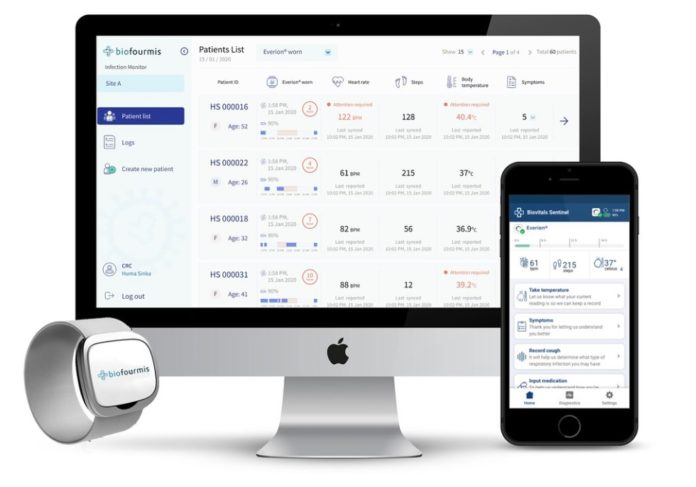The Ministry of Health (MOH) in Singapore has deployed the Biovitals Sentinel platform from Biofourmis to remotely monitor COVID-19-positive patients to aid early detection of deterioration and enable clinicians and nurse teams to intervene early.
MOH has set up community care facilities (CCF) to care for COVID-19 patients who are clinically well and no longer require acute care, and newly confirmed cases with mild symptoms who do not require hospital care. Biofourmis worked with MOH and the healthcare providers at the CCF at Singapore EXPO & MAX Atria and several Swab Isolation Facilities (SIF) – where patients awaiting swab results are isolated – to demonstrate the use of its platform to augment patient care for individuals housed at these facilities, with real-time remote vital signs monitoring by clinicians and nurse teams.
The AI-powered 24/7 remote monitoring technology and analytics are providing clinicians with real-time vital signs, and symptoms for early identification of any physiological changes that could indicate deterioration, and to enable earlier interventions for better outcomes.
The onsite medical teams at the CCF and SIFs are able to access and monitor patients’ vital signs trending and real-time readings remotely using the Biovitals Sentinel dashboard. They are alerted to any significant physiological changes and early signs of deterioration, on their mobile phones, that might require early medical attention and intervention. The remote monitoring helps minimize potential virus exposure to frontline medical teams while providing them access to real-time vital signs data for medical review of a large number of patients at any one time.
The data that Biovitals Sentinel analyzes comes from Biofourmis’ biosensor Everion, which is worn on the upper arm of patients being monitored. In conjunction with the AI-powered Biovitals Analytics, the biosensor is capable of measuring more than 20 physiological signals from the sensor data, including temperature, blood oxygenation, heart rate, blood pulse wave, heart rate variability, respiration rate, inter-beat-interval and others.
Biofourmis worked with MOH to configure the Biovitals Sentinel kits, which comprise the Everion biosensor, clinicians’ dashboard and smartphone pre-loaded with the Biovitals Sentinel patient facing app. This included making the patient-facing app available in six different languages to cater to different patient profiles, setting critical thresholds for alerts to notify abnormalities in key monitoring vital signs and customizing the dashboards for ease of remote monitoring. The patient-facing smartphone app syncs the data in real-time to the cloud for analysis and also collects qualitative data from patients who respond to questions about their symptoms and their functional status. Biofourmis has also set up a remote support team that uses video and chat functionalities to provide remote technical support in multiple languages so that patients understand and adhere to the use of the wearable sensors.
Biovitals Sentinel is also in use at health systems in the United States, the United Kingdom, Australia and Hong Kong. In March, Biofourmis announced that Biovitals Sentinel was selected for a remote monitoring and disease surveillance program in Hong Kong involving patients with diagnosed or suspected COVID-19 infection. The program—administered by The University of Hong Kong—uses Biovitals Sentinel in quarantined patients with suspected disease to identify COVID-19-related physiological biomarkers that could indicate deterioration indicative of active disease.
“We are honored to support the Ministry of Health and the people of Singapore in their efforts to combat the COVID-19 pandemic,” said Kuldeep Singh Rajput, founder and CEO of Biofourmis. “The data and knowledge we have gained and continue to gather in other countries using Biovitals Sentinel are certain to help Singapore—and we will also gain new knowledge as part of this project as well. It is a privilege to know our technology can help these patients achieve better outcomes while also protecting frontline healthcare workers from unnecessary exposure while they deliver optimal care.”
















